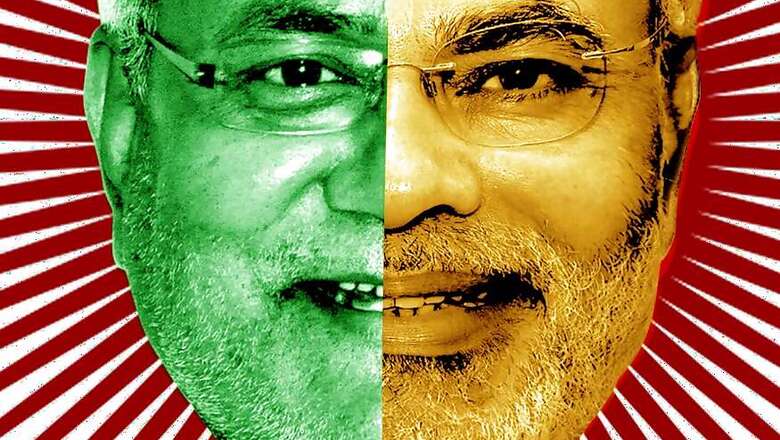
views
The mysterious corridors of a plot in House of Cards would definitely have paled after what we saw in Bihar on Wednesday. From starting out as an electoral and political Opposition to the harbinger of royally corrupt dynastic politics in Bihar, Lalu Prasad Yadav, to embracing him in the name of a secular Mahagathbandhan to screeching ‘Sangh Mukt Bharat’ to a complete volte-face by joining hands with the BJP, Nitish Kumar has emerged as a formidable politician who teaches a lesson or two to the politically puerile Opposition forces in the country.
Also, the significance of this political moment throws up so many definitions and dismantles so many theories that one is encouraged to think beyond the classic silos of opportunism, morality, ideology and pragmatism. It has demonstrated rather clearly that to be in power is a tough negotiation — often one which looks for compounding and competing claims than plain vanilla assertions of elemental moments:
1. Prime Minister Narendra Modi’s tweet consolidates the public position that has taken a firm stand within the communalism-secularism-corruption debate — one that has chosen corruption as a far more appealing and democratic rhetoric than secularism in our political discourse. After a series of attempts at political harakiri by the Opposition (including the largely English media) in raking up elitist issues, totally disconnected from the concerns on ground, after misreading again and again the pulse of the people and politics at the rural and urban units, after the arrogant dismissal of the clear writing on the wall not just elections after elections, after choosing to not acknowledge the dissipating interest of the public in the polarisation brought about in campuses or in front of National monuments in Delhi or carefully orchestrated TV studio wars, the opposition has no option but to justify their harakiri by a graceful admittance of corruption being a larger political issue than secularism.
Perhaps one retweet of the PM’s secular pronouncement of this phase in Indian politics would have saved the Opposition the exhaustion of repeated failed attempts at raking a political nonissue. But as they say in the Hindu tradition, ‘Vinaash Kaale Vipareet Buddhi’.
2. The fact that Nitish Kumar, one of the most glamorised faces of the united opposition, chose to expose this ‘unity’, marks such a serious dent in the whole narrative of the anti-Modi brigade that it would be churlish to dismiss the far reaching consequences of this movement in the politics of this country. One look at the political map of India today suggests the clout of a single party. A studied relook clearly marks the unchartered territories that could or would easily come around in BJP’s kitty because electorates in India have traditionally favored the strong muscles.
3. Nitish Kumar’s hunger to stay in power, come what may, suggests a very practical position that possibly also solves a typically moral question — to be or not to be — that often rattles political scientists. Moving out of the poesy of the electoral campaign to beginning to govern in prose, Nitish has shown rather authoritatively that one needs to grab and stay in power first before anything else.
4. The question on Nitish’s moral authority can be debated or discarded or accepted. But what one can’t take away from him is the showcasing of his morality. Any shrewd reader of politics would respect this man purely because he has managed perception as doggedly as he has managed his morality.
I was a part of his campaign efforts in Bihar. As a Bihari woman, I had been staunchly against the Mahagathbandhan on matters of principles and betrayal of a basic mandate Nitish Kumar enjoys term after term in his reelection. I saw similar feelings echoing within the ranks and files of the JDU – Mahila Prakoshth –primarily. I also saw the discomfort of Nitish in dealing with the rather unholy alliance in his prophetic yet explanatory tweet: जो रहीम उत्तम प्रकृति का करि सकत कुसंग। चंदन विष व्यापत नहीं लिपटे रहत भुजंग।।
This development generates a wave of sympathy for him among a major cross section of Biharis.
From acknowledging that his alliance partner RJD was a foul party to flinging himself in the agnipareeksha of immoral politics, confident that he will emerge untainted, Nitish generated a huge amount of credible sympathy and support for himself in the 2015 elections. In terms of sheer political tamasha, this moving out of that unholy alliance seems to have made a graceful exit of an incorruptible politician. By resorting to a rhetoric of ‘I can’t take it any longer’, he seemed to have emerged virtuous in a dirty war of nefarious designs.
The marvel of breaking the Opposition by not even agreeing to assault them but by slyly moving out of the edifice taking away the foundation itself has been a masterstroke that will define his most politically astute moves in his political lifetime by far.
Anyone in Bihar would admit that Mahagathbandhan was a flop without Nitish Kumar. Any citizen of that state would confide that had it not been for his clean face, the RJD would not have resurrected itself. By taking away the sheen from the lustrous design that the political climate created then, Nitish has outsmarted one and all — including the BJP, to some extent.
(The author is an assistant editor, India Foundation Journal, and project head, northeast operations. Views expressed are personal)




















Comments
0 comment